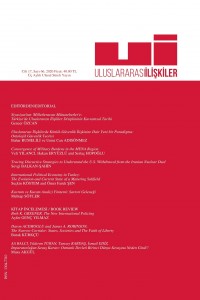Abstract
Türkiye’de Uluslararası İlişkiler, Siyaset Bilimi ve Kamu Yönetimi gibi yakın disiplinlerin durum değerlendirmesini
yapan çalışmalar kavram ve kuram oluşturma, geliştirme ve test etme hususunda önemli bir açık olduğuna dikkat
çekmektedir. Giovanni Sartori, kavramı yöntem sorununun merkezine taşıyan eserleriyle bir geleneğe ismini
vermiştir. Gelenek, matematiksel mantığa dayalı kavram ve kuram analiziyle geçerliği yüksek kavram ve kuramlar
geliştirilmesine, dolayısıyla bilimselliğe katkıda bulunmuştur. Bu makale ‘Sartori geleneği’ni analiz etmekte ve
uygulamalı bir rehber sunmaktadır. Özgün katkıları popülizm, rekabetçi otoriteryanizm, sosyal adalet, başarısız
devlet ve diplomatik özür kavramlarının yapısal ve matematiksel analizi; yukarıdan devrim kuramı ve barış
kuramının yapısal analizi; kuramların matematiksel formül haline getirilmesi ve görselleştirilmesidir.
References
- .....
Abstract
Studies that assess the track record of International Relations and sister disciplines, such as Political Science and Public
Administration, in Turkey, draw attention to the shortcomings regarding concept and theory generation, revision, and
test. Giovanni Sartori’s seminal works that shifted concepts into the center of methodological issues have paved the way
for a tradition named after his name. Through concept and theory analysis based on mathematical logic, this tradition
has contributed to the generation of highly valid concepts and theories, hence to scientificity. This article analyses
the ‘Sartori tradition’ and provides a user’s guide with demonstrations. Its original contributions are to analyze the
structural and mathematical relations within the concepts of populism, competitive authoritarianism, social justice,
failed state, and diplomatic apology; to analyze the structure of the theory of revolution from above and the theory of
peace; to formalize these theories with mathematical notations and to visualize them.
Keywords
Social Science Methodology Necessary and Sufficient Condition Family Resemblance Mathematical Logic Validity
References
- .....
Details
| Primary Language | Turkish |
|---|---|
| Journal Section | Research Article |
| Authors | |
| Publication Date | June 1, 2020 |
| Published in Issue | Year 2020 Volume: 17 Issue: 66 |


